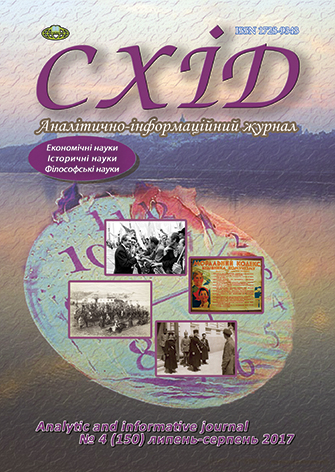Religious studies of cannibalism
DOI:
https://doi.org/10.21847/1728-9343.2017.4(150).111565Keywords:
cannibalism, religious beliefs, beliefs, cults, researchesAbstract
The article provides a comprehensive review of latest religious studies research into the phenomenon of cannibalism. All materials are supported with real-world modern examples, based on media reports and findings of primatology and anthropology. In attempt of revealing religious aspect of cannibalism the article presents interesting findings from the author's own anthropological experience in Western Africa. Using classification schemes of the subject, mainly developed and represented in the field of anthropology, the author compares similar aspects in both approaches of anthropology and religious studies. Having applied a variety of classification schemes and methods, the author demonstrates a number of interesting findings.
Study analyzes religious meaning of cannibalism that overlaps with social and political significance of consuming enemies to mark one's dominance and superiority or consuming a dead relative to express love, or in attempt to distance the spirit of the deceased from the world of the living, or to acquire physical or spiritual qualities contained in the corpse. Thus sacrifice, the aggressive destruction of enemies, and the devoted incorporation of anxious destruction of a loved one's body are all facets of cannibalism that may be presented in different cultural context. Despite the common assumptions that cannibalism has been seen as characteristic of primitive communities the article analyzes variety of cannibalistic practices in modern complex society.
The article contains some fundamental assumptions supporting the belief that traditional approach contributes to seemingly counter-productive common attitude to the phenomenon of cannibalism and prevents academic minds from deeper understanding of it. The author pays particular attention to the aspect of presence or absence of religious beliefs behind all the mentioned acts.Downloads
References
Voevodsky, Leopold (1874), Cannibalism in the Greek myths. Experience in the history of moral development, Balashev Typography, St. Petersburg, 405 p. (rus).
Levi-Strauss, Claude (2010), The sad tropics [translat.], AST, Astrel, Moscow, 410 p. (rus).
Levi-Strauss, Claude (2008), Totemism today. An untamed thought [translat.], Academic Project, Moscow, 520 p. (rus).
Stingl, Miloslav (1984), Indians without tomahawks [translat.], Progress Publishing, Moscow, 453 p. (rus).
Askenasy, Hans (1994), Cannibalism: From Sacrifice to Survival, Prometheus, Amherst, NY, 268 р. (eng).
BBC News, Pakistansuspected cannibal in Punjab re-arrested By M Ilyas KhanBBC News, Islamabadon 14 April 2014, available at: http://www.bbc.com/news/world-asia-27019630
Conklin, Beth A. (2001), Consuming grief: compassionate cannibalism in an Amazonian society, University of Texas Press, Texas, 318 p. (eng).
Brown, Paula & Tuzin, Donald F. (1983), The Ethnography of Cannibalism, Psychological Anthropology Society, Washington, USA, 307 p. (eng).
Cannibalism in Africa documentary - Tribes documentary; available at: [https://www.youtube.com/watch?v=JGBCa2b1ROg]
Stephen, Ellis (2007), The mask of anarchy; the destruction of Liberia and the religious dimension of an African civil war, New York University Press, New York, 350 p. (eng).
Lindsay Jones [ed.] (2005), Encyclopedia of religion, vol.3, 2nd ed.p. cm., Thomson Gale, Macmillan Reference, 10,017 p.
Obeyesekere, Gananath (2005), Cannibal Talk : The Man-Eating Myth and Human Sacrifice in the South Seas, University of California, Berkeley, California, 320 p. (eng).
International Journal of Primatology (2017), February, Vol. 38, Issue 1, pp 31–57.
Palencia-Roth, M. (1985), Cannibalism and the New Man of Latin Americain the 15th- and 16th-Century European Imagination, Comparative Civilizations Review. Vol. 12: No. 12, Article 3 available at: http://scholarsarchive.byu.edu/ccr/vol12/iss12/3
Poole, Fitz John Porter (1983), Cannibals, Tricksters, and Witches in: Brown, Paula, Tuzin, Donald F. Psychological Anthropology Society, Washington, USA. 307 p. (eng).
Sagan, Eli (1976). Cannibalism: Human aggression and cultural form, Harper torch books, New York, 174 p. (eng).
Shipman, Pat (1987), The Myths and Perturbing Realities of Cannibalism, Discover 8, Mar., pp. 70-76 (eng).
Tanaka, Yuki (1997), Hidden Horrors: Japanese War Crimes In World War II, Westview Press, USA, 304 p. (eng).
The Cannibal Warlords of Liberia (Full Length Documentary), 06 jul 2017, available at: https://www.youtube.com/watch?v=ZRuSS0iiFyo&t=459s
Downloads
Published
How to Cite
Issue
Section
License
Copyright (c) 2017 Serhiy Titov

This work is licensed under a Creative Commons Attribution-NonCommercial-NoDerivatives 4.0 International License.
1. Authors bear responsibility for the accuracy of facts, quotations, numbers and names used.
2. Manuscripts are not sent back.
3. The publisher does not always agree with the authors' opinion.
4. The authors reserve the right to authorship of the work and pass the first publication right of this work to the journal under the terms of a Creative Commons Attribution-NonCommercial-NoDerivatives 4.0 International License. This license allows others to distribute (copy) the published work for non-commercial purposes, provided there is mandatory attribution to its authors and a link to the first publication in our journal.
5. The authors have the right to conclude separate supplement agreements that relate to non-exclusive work distribution in the form in which it has been published by the journal (for example, to upload the work to the online storage of the journal or publish it as part of a monograph), provided that the reference to the first publication of the work in this journal is included.

